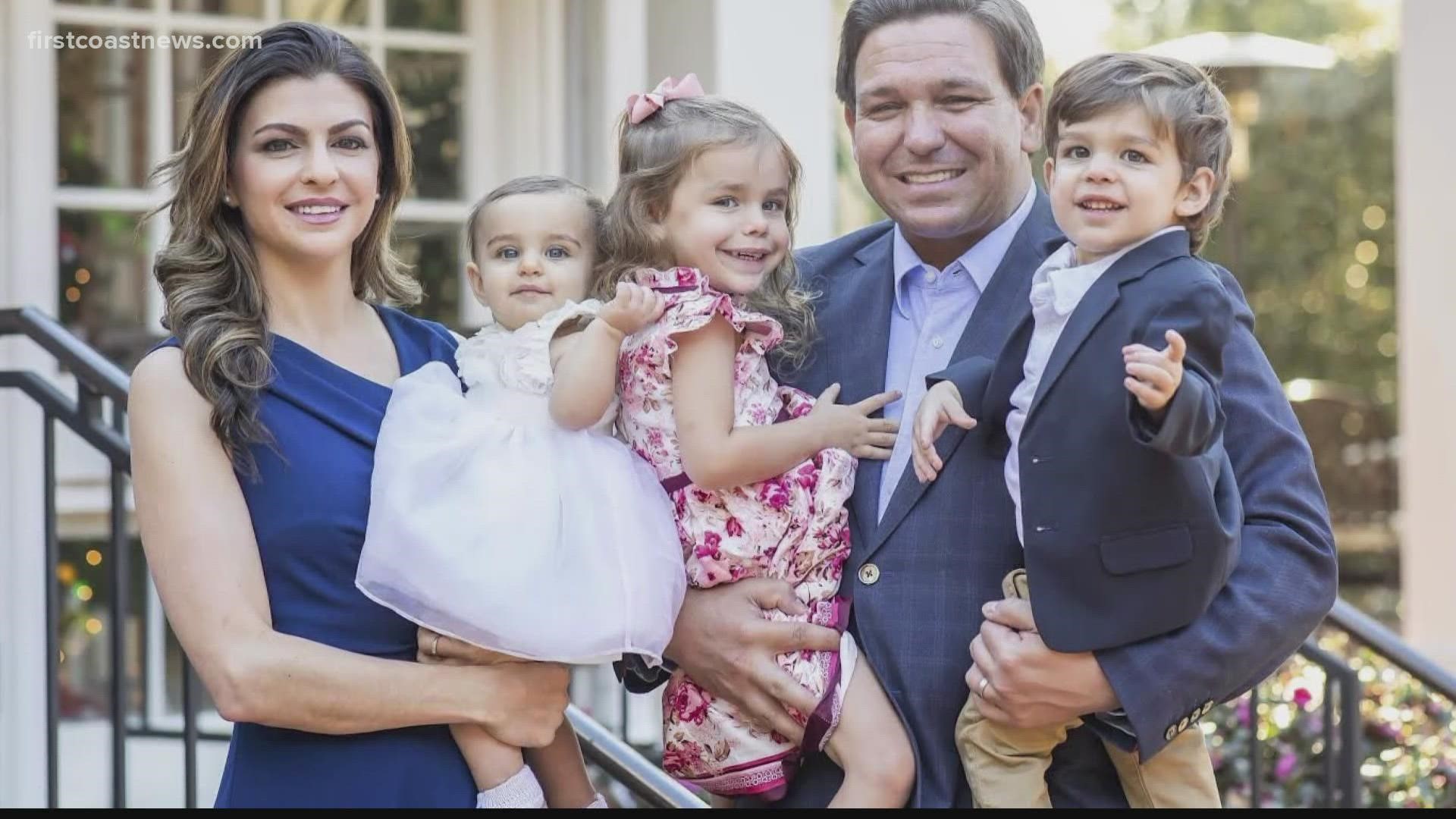TALLAHASSEE, Fla. — Florida first lady Casey DeSantis has been diagnosed with breast cancer, Gov. Ron DeSantis announced in a statement Monday morning.
"As the mother of three young children, Casey is the centerpiece of our family and has made an impact on the lives of countless Floridians," the statement said. "As she faces the most difficult test of her life, she will have not only my unwavering support but the support of our entire family, as well as the prayers and well wishes from Floridians across our state."
Casey DeSantis, a former First Coast News employee, is 41 years old. The couple married in 2010 and have a 4-year-old, a 3-year-old and an 18-month-old.
"Casey is a true fighter, and she will never, never, never give up," Ron DeSantis said in the statement.
A champion of mental health awareness and support across the state, Casey DeSantis has helmed several initiatives to ramp up support and education for Florida students, first responders and health care workers, particularly during the COVID-19 pandemic.
The statement from the governor didn't include any specifics about the first lady's condition. A spokesperson for the governor's office said they don't have any further details at this time.
If you're in need of resources to help you self-screen for breast cancer, you can get a free Buddy Check kit with a card to hang in your shower to remind you when and how to do a self-exam. Just call Baptist Health at 904-202-CARE, and the kit will be mailed to you at no charge.
Dr. Lara Zuberi, an oncologist at Baptist MD Anderson Cancer Center, said breast cancer is a very common diagnosis. She said one in eight women will develop breast cancer during their lifetimes.
"She's very young," Zuberi said, speaking about Casey DeSantis. "She has young children. When I see a young woman with breast cancer, it's a whole different story, because, you know, women are juggling so many things at that age. They're juggling, sometimes their young children, like the first lady has really young children. She has three and they're really, really young, and of course, the mother is kind of the central figure in everybody's life at that age."
Zuberi said breast cancer is more common in older women than younger, but she said over the past couple of years, it is becoming more common in younger women due to a variety of factors. Some of those factors, she said, include better diagnosis early on, and changes in reproductive factors like women having less children and having children at a later age.
"It's all kind of a mix of risk factors, and so because a lot of women will come and say, 'Well, I don't have a family history of breast cancer, how come I got breast cancer?' But the fact is that the genetics is really just 10 percent or less of the breast cancers that we see," Zuberi said. "So, most of the things we are unknown, or they are a combination of different factors."
She said the median age of patients with breast cancer is 63, and 40 is the recommended age to get screened. She also said people should get screened every year.
“I would just urge everybody to be very vigilant, make sure to get their mammograms. Put an alarm for the date you know that you're going to be due for your mammogram, or remember it, you know, by a month," Zuberi said.
"Like if this is Breast Cancer Awareness Month, month, so okay, October I'm going to get it, you know, the first week of October will be the time from now until forever because I think that's a commitment to yourself and to your family," she added.
Zuberi says if your mammogram is negative, but there’s something that can be felt, you should consult a breast surgeon for a biopsy or MRI.
"The main difference between younger women and relatively older women is that they can have sometimes breast cancers that may not be that readily detectable by mammogram also. So, negative mammogram also doesn't mean that there's no breast cancer. Even though mammograms are pretty good, but they can miss about 10% of cancers," she said.
If caught early, Zuberi said, breast cancer is very curable.
"The first three stages are curable, and even more advanced stages. We have really good treatments now so people can actually, you know, have a pretty good outcome," she said.
Casey DeSantis has a team of cheerleaders in her corner - and former First Coast News anchor and three-time breast cancer survivor Donna Deegan is one of them.
"What I always say to women who are first diagnosed is to allow yourself to feel what you feel,” Deegan told First Coast News.
Deegan began the DONNA Foundation years ago, becoming a wellness advocate focusing on breast cancer research. She says with the advancement of technology and medicine, treatment has improved.
During the pandemic, Deegan says screenings slowed considerably by 80% - and she fears there will be delayed diagnoses with more advanced cases - which may not be seen for 5 to 10 years.
"Will we see women who are diagnosed with late-stage breast cancer because they waited? The sad answer to that is probably yes,” she said.

